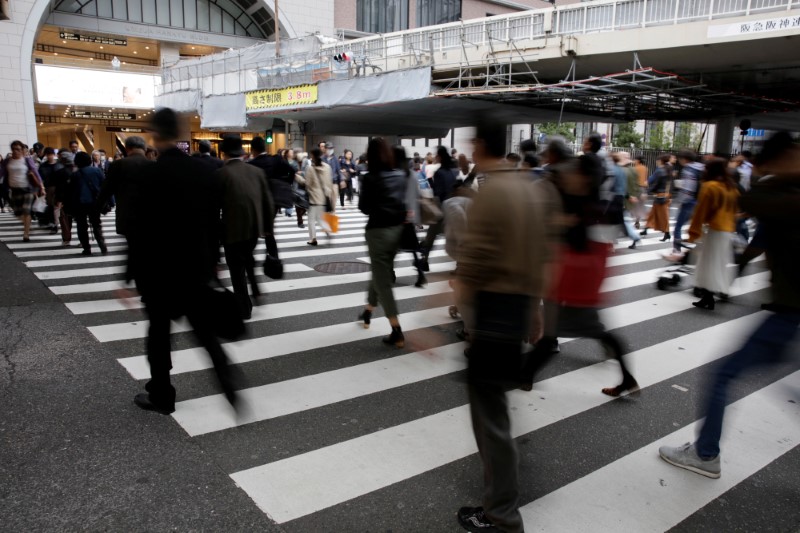
FILE PHOTO: Commuters cross a pedestrian crossing in Osaka, Japan October 24, 2017. REUTERS/Thomas White/File Photo
January 30, 2018
By Stanley White
TOKYO (Reuters) – Labor demand in Japan rose in December to its highest in more than 40 years, which could give labor unions extra leverage in impending spring wage negotiations.
Retail sales rose strongly in December on increased spending on cars and clothes, separate data showed on Tuesday, which could ease concerns about an unexpected decline in household spending in the same month.
The jobs data suggest employers may be more likely to heed the government’s call to raise wages by 3 percent or more at annual negotiations with unions this spring, increasing the chance that consumer spending and inflation will pick up.
The jobs-to-applicants ratio rose to 1.59 from 1.56 in November, which is more than the median forecast of 1.57 and the highest since January 1974.
The seasonally adjusted unemployment rate edged up to 2.8 percent from 2.7 percent in November, data from the Internal Affairs ministry showed. Economists’ median forecast was for the jobless rate to remain at 2.7 percent, the lowest since November 1993.
Retail sales jumped 3.6 percent in December from a year earlier, compared with a median market forecast for a 1.8 percent increase.
Japanese household spending, which is different from retail sales because it is based on surveys sent to a small sample of consumers, fell 0.1 percent in December from a year earlier in price-adjusted real terms.
This is counter to economists’ median estimate of a 1.7 percent annual increase, but an unusually large 23.3 percent annual decline in spending on home repairs pulled down household spending in December.
Japan’s largest business lobby has thrown its weight behind the government’s requests for major companies to raise wages by 3 percent or more this year.
Some companies have little choice but to raise wages as they battle to secure workers in the face of the labor shortage, economists say.
Japan logged seven straight quarters of economic expansion to end-September, its longest uninterrupted stretch of growth since 1994. Exports have been robust, corporate profits are near a record high, and Tokyo stocks are at their highest in 26 years.
The improving economic outlook has increased expectations that Japan’s consumer prices will start rising more quickly, making it easier for the Bank of Japan to meet its 2 percent inflation target.
(Reporting by Stanley White; Editing by Eric Meijer)

